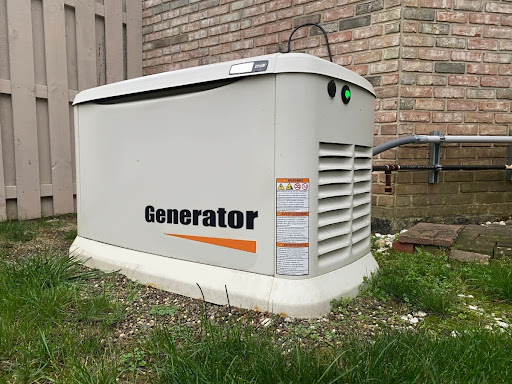Can a Whole-House Generator Power Your AC?

When the power goes out on a hot summer day, your brain jumps into overdrive. First, you’re thinking about the fridge. Will the food spoil? Next, the sump pump. What if the basement floods? But more than anything, you’re worried about the heat building up inside your home. The air gets heavy, family members start getting cranky, and you start wondering, “Can a whole-home generator power my air conditioner?”
That question is a big one for many homeowners, especially those living in areas where power outages and heat waves seem to go hand in hand. Air conditioning isn’t a luxury in those moments. It’s a necessity for comfort, safety, and peace of mind. If you’ve been considering a standby generator, it’s important to know what it can realistically do — and what size you need to keep things cool.
What Is a Whole House Generator?
A whole house generator is a permanent backup power solution. It connects directly to your home’s electrical panel and uses an automatic transfer switch to kick on during a power outage. Within seconds, it starts supplying power to your home’s essential systems. These generators usually run on natural gas or propane and can handle a large portion of your home’s electrical needs.
What Can It Power?
With the right setup, a whole-house generator can keep these items running:
- Air conditioning system
- Kitchen appliances
- Lights and outlets
- Water heater and sump pump
- Heating system and furnace fan
That kind of coverage makes a big difference during extreme weather and long-term outages.
Can a Whole-House Generator Power Your AC?
As you can see, the answer is yes. A whole-house generator can power your AC when you lose power on a hot summer day. In fact, a properly sized standby generator is designed to keep your central air system running even when the grid goes down. Still, that ability depends entirely on choosing the correct generator size.
Why Generator Size Matters
Air conditioners use more electricity than many other appliances, especially when they first start up. That spike in power needs to be considered when deciding on a generator.
- A whole-house generator can power your AC — but only if it’s sized correctly.
- Central AC units typically need much more startup wattage than they do running wattage.
- If your generator isn’t big enough, it might fail to start your AC or trip off when demand spikes.
Which Size Generator Is Needed to Run an Air Conditioner?
You’ll need to know how much power your air conditioning system requires before picking a generator. AC units list both their running watts and starting watts, and those two numbers are important.
Typical Power Needs
Here’s what you can expect from a standard central AC system:
- Running Watts: Around 3,500 to 4,500
- Starting Watts: Often 12,000 to 18,000
So, which size generator is needed to run an air conditioner that pulls this much power? Usually, you’re looking at:
- 16 kW to 22 kW generators for full-house coverage
- At least 18 kW if your AC system is large or older
- A little extra capacity to handle additional appliances like refrigerators or pumps
Generator Fuel Types
Different generators use different fuels. Your choice will affect how much power you can access, how long you can run the system, and how easy the generator is to maintain.
Common Generator Fuel Options
- Natural gas connects directly to a home pipeline and is generally low-maintenance.
- Propane requires a storage tank, but it offers reliable performance and clean burning.
- Gasoline is usually limited to portable generators and needs refueling often.
If you want a whole-house generator that can power your AC, natural gas or propane standby units are typically the most reliable.
Why You Should Avoid DIY Installation
Installing a generator capable of powering a central AC system isn’t a weekend DIY project. It involves electrical work, fuel connections, load calculations, and most importantly, safety measures. Professional installers provide:
- Proper load assessment for all your home’s power needs
- Installation of a transfer switch to manage your home’s power supply
- Connection to your home’s electrical wiring and fuel system
- Ongoing maintenance and emergency support
Partnering with trained professionals helps guarantee that your system works when you need it — and that it doesn’t cause damage or create a safety risk.
Benefits Beyond Just Cooling
A whole-house generator can power your AC, but it also tackles a long list of other problems that come with losing power.
What a Whole-House Generator Also Protects Against:
- Basement flooding caused by a non-working sump pump
- Spoiled food from a powerless refrigerator
- Carbon monoxide risks from unsafe heating alternatives
- Water damage or pipe issues due to loss of HVAC or plumbing support
- Electronics failures from sudden power interruptions
Having full backup power means your home runs smoothly, your family stays safe, and you’re not rushing to fix flood or mold damage later.
Why Choose Zenner & Ritter for Your Generator Needs?
If you’re located in Western New York, your best bet is to call the Buffalo generator experts at Zenner & Ritter. Our technicians will help you choose the right generator for your home and make sure it’s installed safely and correctly.
We’ve earned an A+ rating from the Better Business Bureau, and they’re available 24/7 for urgent needs, such as emergency air conditioning repair during outages. Our experience with both HVAC and generator systems makes us uniquely qualified to install generators that power air conditioning units and more.
Schedule Your Generator Installation Today!
So, can a whole-house generator power your AC? The answer is yes. With the right size and setup, a whole home generator can power your air conditioner along with other essential systems like your sump pump, refrigerator, and lighting. It all comes down to choosing a properly sized generator, understanding your home’s total power needs, and relying on professional installation to keep everything running safely.
Zenner & Ritter is ready to help you choose the best generator for your home, install it safely, and keep your systems powered no matter the weather. Now that you know that a whole-house generator can power your AC, take the next step today. Call now to schedule your generator installation and let our local experts make backup power simple and stress-free!
